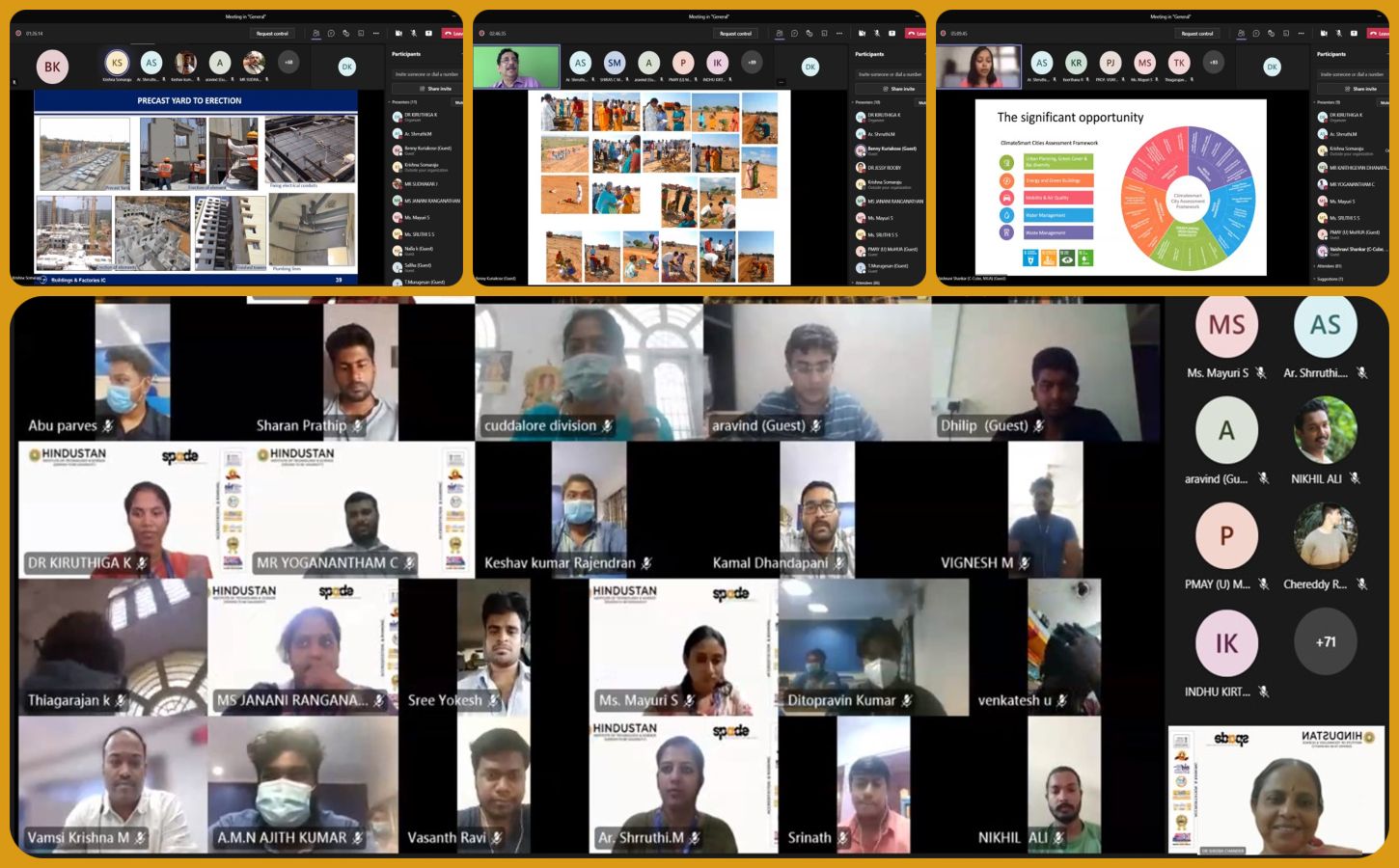-
- Back
-
- Back
-
- Back
-
- Back
-
- Back
-
- Back
-
- Back
-
- Back
Innovation And Technologies
Innovation And Technologies

Innovation And Technologies
School of Planning Architecture and Design Excellence (SPADE) conducted the Workshop on “Innovation and Technologies”in association with the Ministry of Housing and Urban Affairs (MoHUA) and Tamil Nadu Urban Habitat Development Board (TNUHDB) towards the “Awas Par Samvaad”, under the scheme of Pradhan Mantri Awas Yojana –Urban (PMAY-U) on 15 September 2021. The virtual event started with welcome address by Dr. Sheeba Chander, Dean, SPADE, where she welcomed all the speakers and the dignitaries. Dr. S. N. Sridhara, Vice Chancellor, HITS delivered the presidential address and mentioned that the programme coincided with Engineer's Day and would be more meaningful to discuss innovation and technology. After the presidential address, followed by playing the virtual of the on-going projects of AHP under PMAY-U. Mr. T.Murugesan, Executive Engineer, Marina Division, TNUHDB, the chief of the programme presented on the topic “Mivan Technology”. In his presentation, he emphasized on the advantages of using mivan technology in the housing projects. Mr. Sudhakar J, HOD, Architecture &Design, HITS, delivered the vote of thanks, where he thanked the Management of Hindustan Institute of Technology and Science and the MoUHA, India, TNUHDB, chief guest, and the members who attended the event.
Mr. K. Somaraju, Additional Manager, L&T, Mumbai, addressed on “New Emerging Construction Technologies and Opportunities for Technograhis to Learn and Adopt from Light House Projects with Real Time Demonstration”. In his presentation he emphasized the capabilities of affordable housing by using alternative technology. He briefed on the Light House Projects and its need in the current housing crisis. He elaborated on the mass housing projects using precast technology and the role of architects in the design; and also explained about the latest technologies like 3D printing and the application of BIM. He concluded with some skill training on construction by L&T, established in various locations in India.
Dr. Benny Kuriakose, Eco-Architect, B&K Associates, Chennai deliberated on “Role of Indigenous Housing Technologies in Transforming Indian Construction Sector Using Local Material and Practices”. His presentation focused on indigenous architecture which also includes local materials in housing projects. He emphasised the role of architects in the house building designs and highlighted the drawbacks of the mass housing projects. He concluded the significance of appropriate building materials in the construction sector by quoting the tsunami reconstruction project at Tarangambadi, Tamil Nadu.
Dr. Manu Santhanam, Professor & Head, BTCM - Building Technology & Construction Management division Department of Civil Engineering, IIT Madras, presented on the topic “Transformational Role of Innovative Construction Technologies in Mass Housing and Large–scale Adoption”. He gave an introduction of 3D-Printing houses constructed in the printability lab ‘Imprint’ at IIT, in collaboration with Tvasta. He focused on the working principle of the 3D printer with large scale concrete. Further, a brief on the journey of 3D printing technology with various modular structures tested at IIT Madras was given. He concluded that it will be possible to use the 3D printing technology in mass application with sustained R&D and support from the industry.
Ar. Vaishnavi Shankar, Urban Resilience Unit, National Institute of Urban Affairs (NIUA), Delhi, presented on the topic “Methods to Make Housing Climate Resilient, Adopting Environment Friendly Practices and Meeting SDG Goals”. Her presentation focused on the key points like impacts of climate change & climate disaster, and the effects of climate change on the built environment. She also briefed on the resilience of the built environment and what can be done for it by using sustainable development goals. She interacted with the participants by providing an online survey about the priorities in housing /built environment during the pandemic. She concluded with the need of using sustainable strategies in the housing/built environment to be more resilient.
The outcome of the event enlightened the participants with the innovative construction technologies in India. Also, it provided exposure to execute projects where such materials and technologies have been implemented and to make the participants industry-ready.

